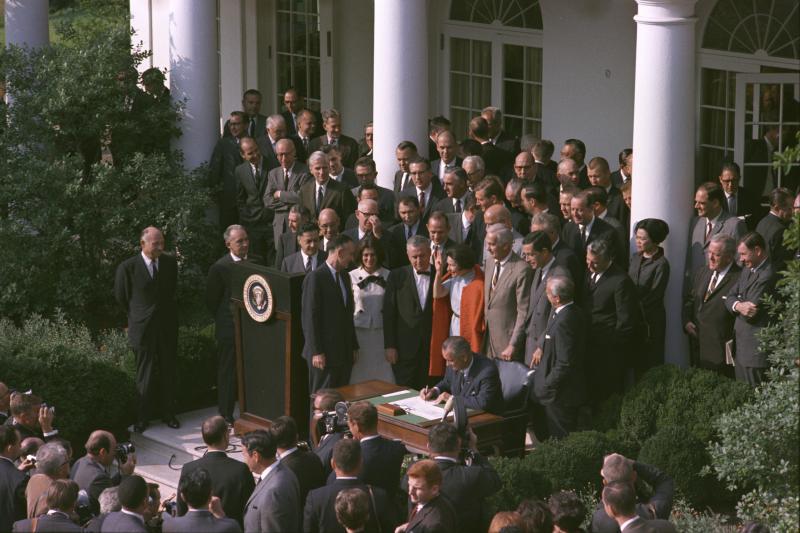Using the Power of Policy: How the National Foundation on the Arts and the Humanities Act of 1965 Fuels Arts Advocacy
By Dr. Lance Nielsen, NFTA Executive Director
When we advocate for the arts, we do so with stories of community impact, students finding their voice, and neighborhoods revitalized by murals and performances. But as arts advocates, we also carry another powerful tool in our toolkit: policy. One of the most foundational pieces of arts policy in the United States is the National Foundation on the Arts and the Humanities Act of 1965, a landmark law that provides the framework for federal support of the arts and humanities and helps legitimize our message to policymakers.
A Brief Overview of the Act
Signed into law by President Lyndon B. Johnson, the National Foundation on the Arts and the Humanities Act of 1965 established two crucial federal agencies: the National Endowment for the Arts (NEA) and the National Endowment for the Humanities (NEH). These agencies were created with the understanding that a great nation is built not only on economic and military strength but also on a rich cultural life.
The Act declares that the arts and humanities belong to all people and are essential to a thriving democracy. It states:
“Democracy demands wisdom and vision in its citizens. It must therefore foster and support a form of education, and access to the arts and the humanities, designed to make people of all backgrounds and wherever located, masters of their technology and not its unthinking servants.”
This language is as relevant today as it was in 1965 and it offers advocates a direct line to the values that underpin federal support for arts and culture.
How the Act Strengthens Our Advocacy
The Act isn’t just a historical artifact, it’s an active declaration of the federal government’s role in supporting the cultural life of the nation. Here’s how it empowers advocates in conversations with elected officials:
1. It Establishes a Mandate
This is an extremely important point to make during the recent cuts to NEA and NEH. The Act gives Congress a clear mandate to fund and support the arts and humanities. When you’re in a meeting with a legislator or writing a letter to your representative, referencing the Act helps connect your request for funding to long-standing, bipartisan legislation that has benefited communities across the country for nearly 60 years.
2. It Affirms Cultural Equity
The language of the Act speaks directly to cultural equity that all Americans, regardless of geography or background, deserve access to the arts and humanities. This is especially powerful when advocating for rural investment, marginalized communities, or underserved populations. It reinforces the idea that access to creativity and history is not a luxury, but a right.
3. It Provides Accountability
Because the Act created official federal agencies, it gives the public a structure through which we can advocate for transparency, funding, and accountability. It also gives us a clear target for our advocacy maintaining and increasing support for the NEA and NEH so they can continue fulfilling their mission.
Tips for Using the Act in Advocacy Conversations
Here are a few ways arts advocates can incorporate the National Foundation on the Arts and Humanities Act of 1965 into conversations with elected officials.
- Name it directly: “I’d like to talk to you today about continued funding for the National Endowment for the Arts, which was established by the National Foundation on the Arts and the Humanities Act of 1965.”
- Reference its core values: Emphasize that supporting the arts and humanities is about fostering wisdom, civic engagement, and national unity just as the Act intended.
- Tie it to local impact: Connect federal support to real outcomes in your community. “Thanks to NEA funding, our town hosted its first arts festival in ten years, creating economic activity and bringing neighbors together.”
- Frame it as bipartisan history: Remind lawmakers that the Act passed with bipartisan support and has been reauthorized and supported under both Democratic and Republican administrations.
Why It Still Matters Today
In times of political uncertainty and with attacks on diminishing the importance of the arts, culture, and history, it’s more important than ever to root our advocacy in strong, values-based policy. The National Foundation on the Arts and the Humanities Act of 1965 is not just a document from the past, it is a living affirmation that the arts and humanities are vital to the American spirit.
As we continue our work to advocate for restoring and promoting robust funding for the NEA and NEH, let’s carry this Act with us, not just as a law, but as a symbol of this simple belief: art matters, culture matters, and every voice deserves to be heard.
References:
National Endowment for the Humanities. https://www.neh.gov/about/history/national-foundation-arts-and-humanities-act-1965-pl-89-209
LBJ Presidential Library. https://www.lbjlibrary.org/news-and-press/media-kits/national-foundation-arts-and-humanities-act
*initial research on National Foundation on the Arts and Humanities Act of 1965 conducted by AI.



